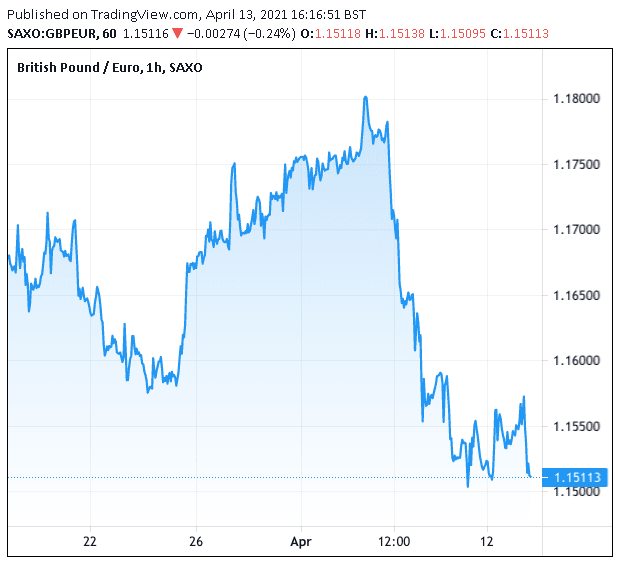Pound Sterling Falls to New 7-Week Low against Euro, Haldane & EU Vaccine Rollout Cited
- Resignation of BoE 'hawk' prompts GBP losses
- But impact to be short-lived say analysts
- EUR remains bid on vaccination 'catch-up'

Above: File image of Bank of England Chief Economist Andy Haldane. Image courtesy of the Bank of England, accessed Flickr. Reproduced under CC conditions.
- Market rates at publication: GBP/EUR: 1.1517 | GBP/USD: 1.3777
- Bank transfer rates: 1.1295 | 1.3490
- Specialist transfer rates: 1.1436 | 1.3680
- Get a bank-beating exchange rate quote, here
- Set an exchange rate alert, here
The British Pound has lost further ground to register a new seven-week low against the Euro over the past 24 hours, as it continues to give back the gains made during the first three months of the year.
A combination of broad-based Euro buying and news that the Bank of England Chief Economist Andy Haldane would be leaving the Bank's Monetary Policy Committee were said to have been contributing factors.
"Sterling sold off yesterday in response to the news of the resignation of Bank of England Chief Economist Andy Haldane," says Francesco Pesole, a foreign exchange strategist at ING Bank N.V.
Haldane has proven to be 'hawk' on the MPC, which is financial parlance for someone that favours raising interest rates, on account of his optimism for the UK growth rebound in 2021.
Above: GBP/EUR has fallen sharply this month.
"Given he was the biggest hawk on the committee, this is a material development, and opens the door to a shift in the centre of gravity on the MPC depending on who might replace him," says Jim Reid, Research Strategist at Deutsche Bank.
Given that a 'hawkish' central bank is one that is associated with currency strength, news of Haldane's departure was credited by some economists to another bout of weakness in Sterling exchange rates.
"Sterling as well as gilt yields have dipped slightly – although not significantly – on the news, implying that the market judges a slightly more dovish tilt to the MPC once Haldane’s leaves. This assessment is broadly right, in our view," says Kallum Pickering, Senior Economist at Berenberg Bank.
Haldane's views on the economy were cited for bouts of strength in the Pound in February, saying economists and markets could be guilty of underplaying the extent of looming inflation in the UK.
Central banks typically raise interest rates when inflation is seen as getting too 'hot'; a side effect of higher interest rates in one country relative to others is a strengthening currency.
"Markets have judged Haldane’s stance as more hawkish than the general MPC consensus," says Pickering.
"At the margin, with the absence of Haldane, the MPC may now react to any forthcoming inflation risks a little later than it otherwise would – but only by a meeting or two at the most," he adds.
{wbamp-hide start}{wbamp-hide end}{wbamp-show start}{wbamp-show end}
Berenberg tell clients markets will need to reassess the new policy tilt of the committee once the new chief economist takes her or his place.
Their calls on the future of Bank of England policy decision making remains unchanged and they continue to expect the Bank to complete its asset purchases by year end – in line with latest BoE guidance.
In 2022 the BoE is likely to set out an exit strategy from its ultra-easy policy stance before hiking the bank rate in 2023.
"The potential for upside surprises in economic performance and inflation tilts the risks for the first hike towards a hike at the end of 2022," says Pickering.
ING have told clients on Wednesday they do not see the negative impact of Haldane's departure on Sterling as being enduring.
"Although a big hawk, his departure shouldn't alter the pound's prospects for the coming months as no imminent BoE tightening was on the table," says Pesole.
Above: The Pound's relative performance over the past week.
A wider demand for the Euro is meanwhile proving to be an additional dominant theme in global foreign exchange markets at present, lending itself to a lower Pound-to-Euro exchange rate (GBP/EUR).
The declines in GBP/EUR contrast to a relative stability in the Pound-to-Dollar exchange rate (GBP/USD).
The Euro-to-Dollar exchange rate (EUR/USD) is also rising and has gone back above the 1.19 level, confirming the single-currency's allure to investors in the short-term.
The Euro appears to have found favour amongst international investors as the region's vaccination campaign finally steps into a faster gear, suggesting Eurozone economies won't be left in the wake of the U.S. and UK for any meaningful period of time.
After a slow start characterised by delays and supply shortages, key Eurozone states France, Germany and Italy have reported a material increase in vaccination rates over the course of the past week.
France announced an acceleration of its much criticised Covid-19 vaccination campaign on Sunday, increasing the gap between the two doses of the mRNA vaccines from Pfizer and Moderna to speed up basic protection, making the Oxford/AstraZeneca vaccine available to anyone over 55.
France delivered 510,000 doses last Friday alone.
Secure a retail exchange rate that is between 3-5% stronger than offered by leading banks, learn more.
In Germany, the number of people who received the first jab jumped by more than a quarter within a week to 12.7m.
"Assuming there is no new noticeable backlash against the vaccines and no further significant delivery problems, it looks plausible that high-risk people (over-75s and staff in the care/health system) will be vaccinated by the end of April and 70% of adults will be vaccinated by the end of the summer," says Yvan Mamalet, an economist with Société Générale.
The Euro's rebound could therefore well be catch-up for underperformance earlier in the year, which will ultimately fade once the story has been fully absorbed by markets.
Despite the recent declines by the Pound, Kurran Tailor, analyst at Citi, says Sterling is well placed to continue its outperformance on the crosses, particularly against the Euro.
"The UK reopening plans remain on track, unlike in Europe, and inflows into value in the context of the longer term UK asset underweight should remain supportive, in contrast to extended EUR longs outlined above," says Tailor.

